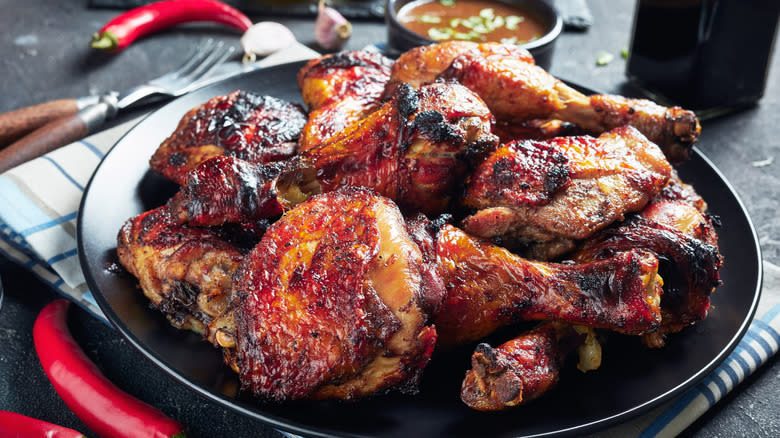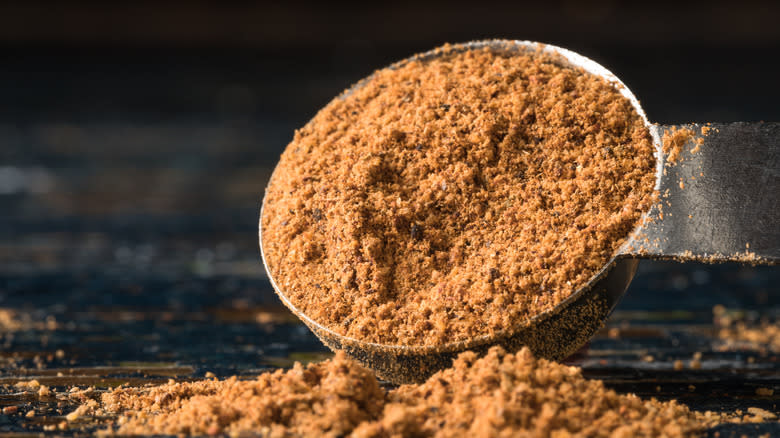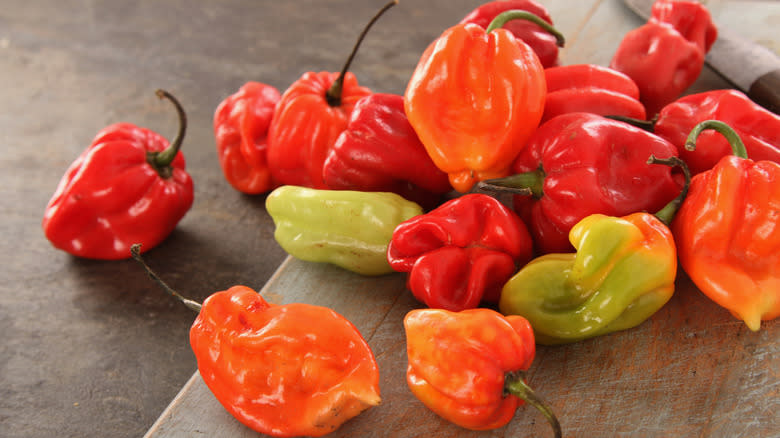How Robert Irvine Balances The Spice In Jerk Seasoning - Exclusive

- Oops!Something went wrong.Please try again later.
What makes Carribean jerk so delicious? Maybe it's the kiss of smoke from the grill. Maybe it's the glass of funky Jamaican rum you're sipping. Or maybe it's the spice. Jamaican jerk seasoning, one of the world's most iconic spice blends, relies on Scotch bonnet peppers for heat. And boy, do those peppers bring the heat. Scotch bonnets have a spice level between 100,000 and 350,000 Scoville units and a sweet, fruity flavor that is perfect alongside the allspice, ginger, and garlic found in jerk recipes. But if you're not careful, those Scotch bonnets can turn your spicy feast into a fiery disaster. It's all about finding the perfect balance between heat and flavor.
When chef Robert Irvine worked in Jamaica, he hosted a weekly jerk dinner, which required a lot of fresh peppers. "There was a young man named Jopi. ... He would come in, wrap himself in plastic wrap from head to toe, a little slit for the mouth, a little slit for the eyes, and he would grind scotch bonnet peppers," Irvine shared in an exclusive interview with Mashed. "You could not breathe in that kitchen. I had to evacuate people when he was about to do that.
Homemade jerk seasoning doesn't require nearly as many peppers, but it's still important to find that balance, which can be tricky. As Irvine says, "It is very hard to balance. You have to understand peppers and especially the scotch bonnet."
Read more: The Best Wings In Every State
Be Judicious With Your Peppers

When making jerk seasoning, balancing the spice level is all about how much Scotch bonnet pepper you use in the first place. The peppers are incredibly hot, and chef Robert Irvine emphasizes how important it is to be careful with that level of heat. "[Jamaicans] pop them and eat them and they get ulcers in their stomach and all that kind of stuff," he explains.
If you've added too much pepper to your recipe, there's no way to undo it. Yes, you can use other ingredients to dilute the heat — Irvine mentions honey, low-sodium soy sauce, and parsley as good options — but there's no taking it back. Instead, start with a light hand and add more heat if you need it. Focus on finding a balance between the heat, sweet, and savory flavors to build a complex jerk seasoning.
Resist the urge to test your Scoville tolerance and instead focus on flavor. "I want you to enjoy the food with a hint of spice, not be killed by the spice in your mouth and not be able to taste the food," says Irvine. "Otherwise, why have I cooked it?"
Handle With Care

Whether you're handling a humble jalapeño or an eye-watering Scotch bonnet, it's important to be careful when processing fresh peppers. Capsaicin, the compound that makes peppers spicy, can easily transfer to your knife, cutting board, and hands, and can not only cause a warm or burning sensation on your hands (known as jalapeño hands) but can lead to serious pain and discomfort if you touch your eyes or other sensitive parts of your body.
Robert Irvine recommends caution when handling hot peppers. "Be very careful. Wear gloves, wear eye protection when you use hot peppers, because if you touch yourself afterward and you haven't worn gloves, believe me, you'll be screaming for about 20 hours. Eyes and anywhere else."Wearing gloves will keep the capsaicin off of your skin and will prevent transfer to anywhere else on your body. Be sure to thoroughly wash any equipment you've used in hot, soapy water after the peppers are processed so the capsaicin doesn't transfer to other foods. If you do accidentally get capsaicin in your eye, rinse for a few minutes with sterile saline eye wash or fresh water — not milk — and then apply eye drops to soothe your eyes. Why not milk? While milk is a great foil for hot peppers you've eaten, it's impossible to eliminate all bacteria in milk, which means putting it in your eye runs the risk of causing an infection.
Read the original article on Mashed

